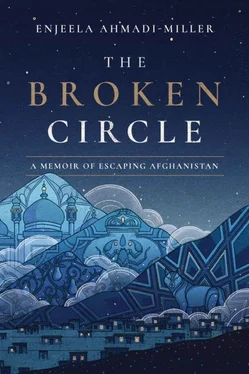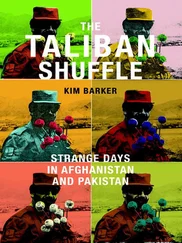The traffic slowed and piled up as we neared a roadblock manned by Afghan and Russian soldiers. Grim-faced Afghan soldiers stepped up into the bus and examined each of us as they made their way down the aisle. They clutched their shiny black rifles as they hesitated, scrutinizing every face. It appeared they were looking for someone from the way they peered down at the passengers in front of me. I thought they’d see my new sneakers. People from the villages didn’t wear brand-new sneakers. Then I thought of the money in my shoe. It had been stupid to put it there. As if on cue, they started yelling at people, calling them names, saying they were looking for cowards who were afraid to fight for their country.
I lowered my head. Next to me, Masood sat tall and fearless, never taking his eyes off the soldiers. I saw his hand move to his waist. They stared at Masood but passed him by. A soldier grabbed a middle-aged man across from me. He yanked the man roughly to his feet by his collar.
“Where are you going?” the soldier yelled in his face.
“Home,” he said, fear in his voice. “I’m going home.”
“You look like one of the escaped prisoners,” the soldier said. “We’ve been searching for you.”
“Bring him outside,” another soldier said. They dragged the man out and threw him on the road right outside our window.
Four or five soldiers surrounded him and began shouting, “Where are you going? What were you doing in Kabul?” They pointed the gun right at him; one soldier shoved the muzzle of his rifle right in the side of his head. The man tried to answer, but they kept on shouting at him. They called him a dog for running away.
“I would never leave my country,” the man said, raising his head from the dirt. “This is my motherland.”
The man sounded just like Padar. He always spoke of the motherland; this was where we were born, our homeland; it made us who we were. Everything I was leaving flashed through my mind—my house, my school, my beloved friends, Shahnaz and Saleem, and Izmarai and Auntie. Sadness came over me, as if I was walking away from a great treasure, one I could never replace no matter how hard I searched for something like it. The smell of the ashoka tree came to me, a sweetness on the air, the sign of spring in Kabul, when the city came to life. I would never forget Kabul.
They continued yelling at him, wanting him to admit to something. Now he was on his knees begging.
“I was shopping in Kabul for my wife and daughter.” He kept repeating that, but they wouldn’t listen.
Masood leaned down close to me. “Go outside right now and tell the soldiers he’s your father.” He urged me on with his eyes.
Padar said he was a man we could trust, so I didn’t even take a breath to think about it before I rose to my feet and made my way down the aisle. I stepped through the open door onto the road. The man held up his hands, pleading with the soldiers, a deathly fear on his face. I’d never seen a man so afraid, so beaten down, as if he could die right at that moment from shame. I’d never seen an Afghan man treated like that before. I pulled my chador tight against my face. I had to think of something to say that would convince these men to let him live.
“He’s my father,” I said, holding out my hand toward him. “We were in Kabul shopping. We were just going home.” I lifted a foot to show off my new sneakers, shiny and white. The same shoe that was lined with new afghani bills to pay for my escape. I wiggled my new shoe at the soldiers.
The man reached for my hand, hesitantly at first, then he took it with a sigh of relief. “Yes, this is my daughter.”
I walked slowly up to the soldiers. “Please let him go, please, please, please.” I used my most whining voice, the one that always irritated everyone.
An Afghan soldier kicked the man one more time. “You dirt. Get up and go to the bus.”
I held his hand, and we boarded the bus. I led him to his seat and sat next to him. He held my arm tight and whispered to me, “You have a lot of courage.” He thanked me several times. After the bus had rumbled miles down the road, I took my place next to Masood. I knew he was proud of me from the glow on his face.
“You did the right thing,” he said to me.
I could tell by the way Laila and Zulaikha were frowning at me from their seats in front of us that they weren’t so happy with my bravery. As soon as I sat down next to him, they let Masood have it.
“Why did you tell her to go out there?” Laila said. “She could have gotten killed.”
“Don’t ever do that again,” Zulaikha said to me. “Those soldiers will shoot you if they think you’re lying.”
“Afghan soldiers wouldn’t hurt a little girl,” Masood said, “if they don’t think she’s trying to escape. Besides, she saved a life.”
“You’re supposed to protect us,” Laila hissed, the anger simmering in her eyes. “She could have gotten killed, and it would be all because of you.”
Masood turned away, apparently not interested in having his decisions examined by anyone, especially two teenage girls. As angry as my sisters were, I knew I’d done the right thing in helping that man. And what surprised me most was that I hadn’t felt afraid of getting hurt at all. That possibility came to mind only when Laila mentioned it with fire in her eyes. It finally occurred to me that she could be right and that she knew, since she was older and wiser. If Padar were there, I wouldn’t have had to go out, he would have stood up for that man. I’d never seen him afraid of anyone, and when those soldiers showed up at our front door looking for Ahmad Shah, he had been so cool in the way he spoke to them, like they were mistaken to think they could be right. As much as I disliked his drinking, I knew him as a brave man who always stood up for the weak and helpless. He would have had something to say to those confused soldiers.
Masood had said if we weren’t escaping, they wouldn’t hurt us. But we were escaping, and we had new sneakers and backpacks full of clothes and money. If they had searched us, they would have figured out our intentions.
I rested my head against the glass and watched the mountains slip by as the bus rumbled on. Padar wasn’t here to do the right thing. And maybe what Masood had been showing me was that I was alone here, and I’d have to stand up for myself, and I’d have to make brave choices. He would help us to know what to do, but it was going to be up to each of us to be afraid or not to be afraid.
Masood told us that we couldn’t go straight into Jalalabad and then on to Pakistan; we’d be getting off the bus at the first village on the road to Jalalabad. There were too many Russian soldiers on the main road to the city.
The army had set up roadblocks all the way into the Khyber Pass to stop people from escaping. They were forcing men from their cars at gunpoint and sending them off to fight for the government. I thought of my brother Ahmad Shah, who had escaped rather than join the army, and my brother Zia, who in the next year or two would be conscripted to fight too, if we had stayed. Then I thought of Mommy, and I remembered all the arguments she used to have with Padar over leaving Kabul. Everyone in her family was fleeing the city, and she thought that we should follow. I wished we had all flown away with her and my other sisters. It would have been easier to get out back then, before the Soviets came. She should have taken us all. But she didn’t, and so I sat with my other siblings, who were now sleeping or staring out the window on a bus to Jalalabad.
The bus wound through the rocky mountain passes, the narrow road hugging the mountainside as we edged along, just feet from a steep cliff. Traffic became heavy on the road, with big trucks of every kind, other buses of villagers and refugees from Kabul, and cars jammed with families with all their belongings tied to the roofs. We slowed to a crawl, then stopped. We sat there for a while, beginning to sweat in the afternoon heat, before the bus driver announced that we would have to get off. A landslide had blocked the road up ahead, and we would have to walk the rest of the way. We gathered our backpacks and filed out the door with the rest of the travelers.
Читать дальше













